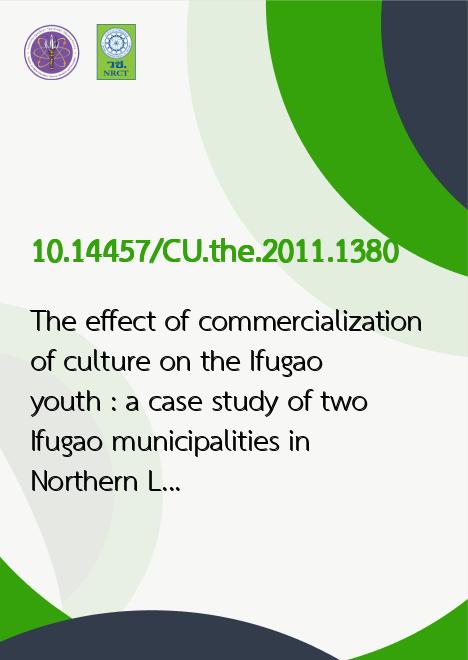
|
The effect of commercialization of culture on the Ifugao youth : a case study of two Ifugao municipalities in Northern Luzon, Philippines |
|---|---|
| รหัสดีโอไอ | |
| Title | The effect of commercialization of culture on the Ifugao youth : a case study of two Ifugao municipalities in Northern Luzon, Philippines |
| Creator | Sandvik, Anniken Renslo |
| Contributor | Withaya Sucharithanarugse, Sida Sonsri |
| Publisher | Chulalongkorn University |
| Publication Year | 2554 |
| Keyword | Ifugao (Philippine people) -- Commerce, Culture, อิฟูเกา (ชาวฟิลิปปินส์) -- การค้า, วัฒนธรรม |
| Abstract | This thesis analyzes how the young population in Ifugao is affected by the commercialization of their indigenous culture. Because of various factors like the conversion from the ancient Ifugao religion into Christianity, the adaption of national governing- and education systems, and the introduction of international mass media, the indigenous Ifugao cultural practices are vanishing. As an attempt to revive these practices, the municipal and provincial governments in Ifugao are arranging annual festivals showcasing the indigenous culture. In this process the Ifugao culture is commercialized, as the indigenous practices are being performed out of their original contexts as parts of a program created to entertain an audience. By examining the experiences concerning these festivals in the two municipalities Hungduan and Lagawe, this thesis discusses whether or not the commercialization process brings the ancient culture closer to a survival. As the future of the Ifugao culture is in the hands of the young generation, this group has been the focus group of this research. The two field studies took place during two annual municipal festivals, and here interviews and conversations with the Ifugao youth were carried out, questionnaires were handed out, and observation, mostly non-participant, was conducted. This resulted in this thesis arguing that by participating in the commercialized cultural festivals, the Ifugao youth increase their indigenous knowledge, and their feeling that their ancient culture is an asset becomes stronger. Thus, the Ifugao youth’s interest in keeping the ancient culture alive grows, and the arranging of festivals serves as away to protect the Ifugao culture. Because the Ifugao culture is closely linked to the agricultural cycle and the production of rice, this thesis also discusses whether or not the commercialization of culture leads to increased interest in the ancient rice terraces’ sustainability among the youth. Here, the thesis argues that an increased interest in keeping the Ifugao culture alive may over time lead to an increased interest in maintaining the rice terraces. If so, the commercialization of culture will serve as a way to keep the terraces sustainable. However, it is stressed that this connection is fragile, and that the Ifugao society still faces a great challenge concerning the survival of the rice terraces. It is suggested that a thoroughly study is conducted, where the thoughts, views and ideas of the youth are identified and listened to. As this thesis shows that the interest in the continued survival of the rice terraces exists, and that the youth do find the terraces both valuable and important, the remaining task is to find out how this level of interest can be increased. |
| URL Website | cuir.car.chula.ac.th |